
Order now
★ “This modern fantasy has intrigue, adventure, and romance…Shulman’s prose is fast paced [and] filled with humor”
—School Library Journal, starred review
“Captivating magic fills the pages of this exciting new novel…a richly imagined adventure with easy appeal for Harry Potter fans.”
—Booklist
“Lovers of fairy-tale twists and library-related stories—have we got a book for you! The Grimm Legacy is the sort of clever charming book perfectly designed to curl up with at the end of a long frustrating day. It is balm for a battered soul. If only I could distill and bottle the way this book made me feel, I’d be a wealthy woman and could give up this nonsense of working for a living. … This inventive romp is pure fun from beginning to end and I can’t wait to snuggle in on the next rainy day and read it all over again.”
—Lynn Rutan, Booklist Online
“A fizzy confection…the story buzzes along at a delightful clip.”
—Marjorie Ingall, The New York Times
“Shulman combines down-to-earth teens concerned with fitting in with a wonderfully occult magical world.”
—Horn Book
“Shulman makes us privy to the delectable details of Grimm fairy tales while adding her own fresh twist.”
—Shelf Awareness
“The Grimm Legacy is terrific fun for tweens and teens, and not to be missed.”
—BookPage
“A tour-de-force fantasy novel also grounded fully in the here and now.”
—Kathleen Burke, Smithsonian
“Like Harry Potter's Hogwarts, the New York Circulating Material Repository is a complex magical universe with a delicate relationship to the mundane world outside. … Shulman captures that special satisfaction of discovering that not only can you handle your first job, you're actually good at it.”
—Sonja Bolle, L.A. Times
“Vivid sensory descriptions (hexed gingerbread tastes ‘[s]weet and dark, like roast duck or cedar pencils’) and delightful magical happenings both thrilling and nefarious.”
—Kirkus
“Shulman (Enthusiasm) intermingles classic fairy tale elements and modern-day conflicts in this clever novel set in New York City. … Mixing tongue-in-cheek humor with suspense, Shulman conjures an enticing slice of magic realism that fairy tale buffs should relish.”
—Publishers Weekly
“The Grimm Legacy is a splendid fantasy, full of suspense, adventure, a good-vs.-evil plot, and a hint of true love. A giant of a fairy tale!”
—Common Sense Media
“The Grimm Legacy works on multiple levels as fantasy, mystery, teen romance, comedy, and of course, as fairy tale…perfect beach reading.”
—Pauline J. Alama, Mythopoeic Society
“L'auteur mêle adroitement deux univers chers aux jeunes lecteurs, celui du collège, impitoyable et familier, celui des contes, mystérieux et très excitant en l'occurrence, puisque l'auteur exploite ici les histoires peu connues des frères Grimm.” (“The author skillfully combines two universes dear to young readers—that of school, ruthless and familiar, and that of fairy tales, mysterious and very exciting in this case, since the author uses little-known stories of the brothers Grimm.”)
—Le Figaro, France
Book trailer:

The Grimm Legacy GRIMM LEGACY | BOOK 1
Awards and Honors:
- ALA Best Fiction for Young Adults 2011
- IRA Children's Choices 2011, Advanced Readers
- Children's Book Committee Bank Street College of Education Children's Choices - Best Books of 2011, Fantasy, ages 9-12
- School Library Journal Best Books 2010: Fiction
- Smithsonian, Notable Books for Children 2010
- Mythopoeic Fantasy Award for Children's Literature 2011, Finalist
- Nominated for Readers Awards in 14 states: Arkansas, Connecticut, Georgia, Maryland, Missouri, New Hampshire, Oklahoma, Oregon, Pennsylvania, South Carolina, South Dakota, Tennessee, Texas, and Vermont
- Western Australian Young Readers Book Award 2014, Nominee
- Leserpreis–die besten Buecher 2010 (German award), Shortlist
- Grand Prix de l’Imaginaire (French award) 2015, Finalist
![]()
What if fairy tale magic really existed?
Lonely at her new school, Elizabeth takes a job at the New York Circulating Material Repository, hoping to make new friends as well as pocket money. The Repository is no ordinary library. It lends out objects rather than books—everything from tea sets and hockey sticks to Marie Antoinette’s everyday wig.
It’s also home to the Grimm Collection, a secret room in the basement. That’s where the librarians lock away powerful items straight out of the Brothers Grimm fairy tales: seven-league boots, a table that produces a feast at the blink of an eye, Snow White’s stepmother’s sinister mirror that talks in riddles and has a will of its own.
When the magical objects start to disappear, Elizabeth and her new friends embark on a dangerous quest to catch the thief before they’re accused of the crime themselves—or the thief captures them.
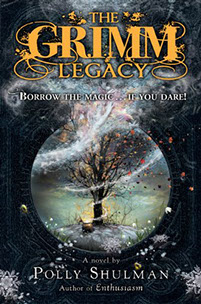
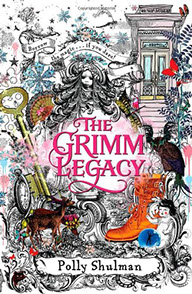
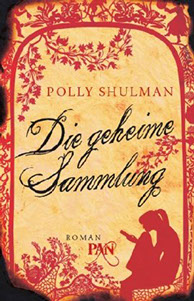
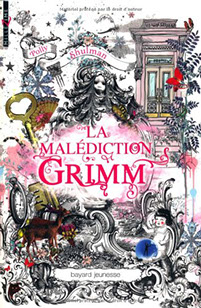

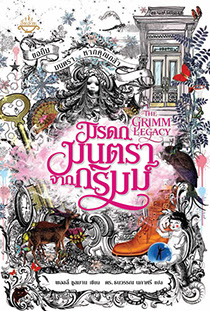
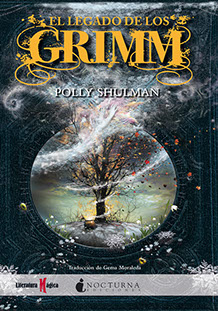
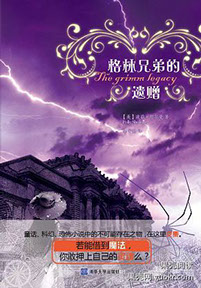








The Hardback Edition
The UK Edition
The German Edition
The French Edition
The Taiwanese Edition
The Thai Edition
The Spanish Edition
The Chinese Edition

Read an excerpt from Chapter 1 ▾
I Receive A Gift And A Summons
SNOW FELL HARD—big, sticky flakes that got under my coat collar where the top button was missing. The weather had held up my subway, and I was hoping I wouldn’t be late for class.
Then in front of school, I saw a homeless woman struggling with a shopping cart. When a passing taxi sent out a freezing wave of gray slush, she and her cart toppled over into the gutter. So I had to help.
The woman’s hands were icy claws as I pulled her to her feet. She felt much lighter than she looked in her bulky rags. “Thank you,” she said, shaking snow off the blanket that had covered her shoulders. Underneath she wore a T-shirt stuffed with newspaper. And on her feet, to my horror, I saw sandals.
The late bell was about to sound, but I couldn’t abandon someone wearing sandals in the middle of a snowstorm—not when I had a spare pair of shoes with me. I helped her set the cart back on its wheels, then took my gym sneakers out of my bag. “Here,” I said. “Can you use these?” They probably wouldn’t fit—I have embarrassingly large feet. But at least they would be better than sandals.
The woman took them and turned them over, studying the soles. She held the right sneaker close to her face and peered inside, seeming to sniff at it. The left she held to her ear like a telephone.
At last she looked at me. Her eyes were surprisingly bright, a pale, luminous gray like storm clouds.
“Thanks,” she said.
“You want my socks too? Probably not, they need to be washed.” As soon as I’d said it, I realized it was a pretty insensitive thing to say—people with nowhere to live don’t have much opportunity to do laundry. Probably they’re used to dirty socks.
“Thanks,” said the woman again, starting to smell the socks but evidently thinking better of it. “Wait,” she said as I turned toward school. She rummaged through the bags in the cart as the snow continued to tumble down and melt in my collar. I was getting impatient, but I waited till the woman found what she was looking for and held it out to me. “Keep it safe.”
“Um, thanks.”
It was a number 2 pencil—the ordinary yellow kind, with a pink eraser, like you use for the SATs. I put it in my book bag, pulled my scarf tighter, and turned toward the school door.
“Hurry, Elizabeth, you’re late,” said a grim voice. My social studies teacher, Mr. Mauskopf, was holding the door open for me. He was my favorite teacher, despite his intimidating sternness.
The homeless woman gave him a little wave, and Mr. Mauskopf nodded back as the door swung shut behind us. I thanked him and hurried to my locker, hearing the late bell chime.
The day went downhill from there. Ms. Sandoz made me play volleyball barefoot when she saw I didn’t have my sneakers, and charming Sadie Cane and Jessica Farmer spent the period playing Accidentally Stomp on the New Girl’s Toes. Then in social studies Mr. Mauskopf announced a research paper due right after New Year’s, effectively eliminating the vacation.
“Choose wisely, Elizabeth,” he said as he handed me the list of possible topics.
My stepsister Hannah called me that evening to ask me to mail her her black lace top. She’d handed it down to me when she left for college, but with Hannah, gifts rarely stayed given for long.
“What are you up to?” she asked.
“Working on ideas for my social studies research paper. European history, with Mr. Mauskopf.”
“I remember Mauskopf—what a weirdo! Does he still wear that green bow tie? And give out demerits if he catches you looking at the clock?”
“Yup.” I quoted him: “‘Time will pass—but will you?’”
Hannah laughed. “What are you writing about?”
“The Brothers Grimm.”
“The fairy tale guys? For Mauskopf? Are you crazy?”
“It was on his list of suggested topics.”
“Don’t be a little goose. I bet he just put it on there as a test, to see who would be dumb enough to think fairy tales are history. Hey, I probably still have my term paper from that class. You can use it if you like. I’ll trade it for—hm—your good headphones.”
“No thanks,” I said.
“You sure? It’s about the Paris Commune.”
“That’s cheating. Anyway, Mr. Mauskopf would notice.”
“Suit yourself. Send me that lace top tomorrow, okay? I need it by Saturday.” She hung up.
I chewed at the end of my pencil—the one the homeless woman had given me—and stared at the topic I’d circled, wondering whether to follow Hannah’s advice about switching topics. Mr. Mauskopf took history very seriously, and fairy tales don’t sound that serious. But if he didn’t want us writing about the Brothers Grimm, why put them on the topic list?
Fairy tales were a big part of my childhood. I used to sit in my mother’s lap while she read them out loud and pretend I could read along—until, after I while, I found I actually could. Later, in the hospital when Mom was too sick to hold a book, it was my turn to read our favorites out loud.
The stories all had happy endings. But they didn’t keep Mom from dying.
If she were alive now, I thought, she would definitely approve of my learning more about the men who wrote them. I decided to stick to my choice.
Strange as it sounds, once I had decided I found myself actually looking forward to the term paper – it would give me something interesting to do. Vacation was going to be lonely since my best friend, Nicole, had moved to California I hadn’t made any new friends in the four months I’d been at my new school, Fisher, and the girls I used to hang out with were too busy with ballet to pay much attention to me any more.
I missed my ballet classes but Dad said we couldn’t afford them now that he had to pay for my stepsisters’ college tuition, and I was never going to be a professional dancer anyway—I wasn’t obsessed enough, and my feet were too big.

FAIRY TALES MIGHT NOT BE HISTORY, but as I learned in the hours I spent in the library over Christmas break, Wilhelm and Jakob Grimm were historians. They didn’t invent their fairy tales—they collected them, writing down the folk tales and stories they heard from friends and servants, aristocrats and innkeepers’ daughters.
Their first collection of stories was meant for grownups and I could see why—they’re way too bloody and creepy for children. Even the heroes go around boiling people in oil and feeding them red-hot coals. Imagine Disney making a musical version of “The Handless Maiden,” a story about a girl whose widowed father chops off her hands when she refuses to marry him!
I thought I’d done a pretty good job when I finished the paper, but I still felt nervous when I handed it in. Mr. Mauskopf is a tough grader.

A FEW DAYS AFTER WE RETURNED FROM VACATION, Mr. Mauskopf stopped me in the hall, pointing a long forefinger at the end of an outstretched arm. He always seemed to have twice as many elbows and knuckles as other people. “Elizabeth! Come see me at lunch,” he said. “My office.”
Was I in trouble? Had my paper creeped him out? Was Hannah right—had I failed some kind of test?
The door to the social studies department office was open, so I knocked on the doorframe. Mr. Mauskopf waved me in. “Sit down,” he said.
I perched on the edge of a chair.
He handed me my paper, folded in half along the vertical axis. Comments in his signature brown ink twined across the back. I took a breath and willed myself to look at the grade.
“Nice work, Elizabeth,” he said. Was that a smile on his face? Almost.
I opened the paper. He had given me an A. I leaned back, my heart pounding with relief. “Thank you.”
“What made you choose this topic?”
“I don’t know—I always loved fairy tales. They seem so—so realistic.”
“Realistic? That’s quite an unusual view,” said Mr. Mauskopf with a hint of a smile.
“You’re right.” I felt dumb. “What I mean is, all the terrible things that happen in fairy tales seem real. Or not real, but genuine. Life is unfair, and the bad guys keep winning and good people die. But I like that that’s not always the end of it. Like when the mother dies and turns into a tree and keeps helping her daughter, or when the boy who everybody thinks is an idiot figures out how to outwit the giant. Evil is real, but so is good. They always say fairy tales are simplistic, black and white, but I don’t think so. I think they’re complicated. That’s what I love about them.”
“I see.” Mr. Mauskopf consulted his planner. “You’re new this year, aren’t you?”
I nodded. “I used to go to Chase, but both my stepsisters are in college now, so the tuition…” I stopped, a little embarrassed to be discussing my family finances.
“Ah, so you have stepsisters,” Mr. Mauskopf said. ”I hope they aren’t the evil Grimm kind?”
“A little.” I replied. Veronica’s five years older, and Hannah—Hannah hated sharing her room with me after my father and I moved in. Hannah liked having someone to boss around the way Veronica bossed her. Hannah was always taking my things and never letting me use hers. But I couldn’t say any of that—it seemed too disloyal. “My stepsisters and I aren’t really that close.”
Mr. Mauskopf gave me the ghost of a smile, as if we were sharing a joke. Then he asked, “Did you ever replace your sneakers?”
“My sneakers?”
“I recall seeing you give away your sneakers -- very generous of you”
“I haven’t had a chance,” I told him. I didn’t want to say more—I wasn’t going to get into our embarrassing financial situation again.
“I see.” He cleared his throat. “Well, Elizabeth, this is all very satisfactory. Would you like a job?”
“A job? What kind of a job?”
“An after-school job. A friend of mine at the New-York Circulating Material Repository tells me they have an opening. It’s a great place. I worked there myself, when I was your age.”
I tried to imagine him my age, but the bow tie got in the way. “Is that like a library?”
“‘Like a library.’ Exactly. Well put.”
“Yeah—yes, please. I’d like that,” I said. A job meant money for things like new gym shoes, and it wasn’t like I had a crammed social schedule.
Everybody at Fisher had known each other for eons. It was already taking them a long time to warm up to me, the new girl. Then I made the mistake of sticking up for Mallory Mason when some of the cool girls were making up songs about her weight and her braces. Worst of all, Ms. Stanhope, the assistant principal, overheard me and used me as an example of “compassionate leadership” in her next “class chat.” After that, nobody wanted to have anything to do with me except Mallory herself. But I didn’t actually like her.
Who knows? Maybe if I took the library job, I would make friends there.
Plucking his fountain pen from his breast pocket, Mr. Mauskopf wrote a number on a slip of paper, folded it vertically, and handed it to me pinched between his index and middle fingers. “Call and ask for Dr. Rust,” he said.
“Thank you, Mr. Mauskopf.” The bell rang, and I hurried to my next class.

THAT AFTERNOON WHEN I GOT HOME I went straight to my room, avoiding the living room so Cathy, my stepmother, wouldn’t rope me into doing errands or force me to listen to her brag about my stepsisters.
I wished my father were home, so I could tell him about my new job. Not that he listened to me much these days. Instead, I told Francie, my doll. I know it sounds babyish, but she was my mom’s doll, and sometimes talking to her makes me feel a tiny bit like I’m talking to Mom.
Francie smiled at me encouragingly. Of course, she always smiles, since her smile is sewn on—but I still took it as a good sign.
Francie is the only one of Mom’s doll collection that Cathy let me keep after Hannah chipped Lieselotte’s nose. Lieselotte was the crown of Mom’s collection. She’s a bisque doll made in Germany over 150 years ago, and worth a lot of money.
“I’ll just put these away until you’re old enough to take care of them properly,” said Cathy, packing the dolls in a box.
“But it wasn’t me!” I protested. I knew better than to blame Hannah, though. I’m not a tattletale, and besides, Cathy always sided with her own daughters. At first I used to complain to my father, but he would just say, “I need you to get along with your stepsisters. I know you can. You’re my little peacemaker. You have a big, generous heart, just like your mother.” So I told Cathy I didn’t break Lieselotte, but I didn’t say who did.
“If you’re not old enough to take responsibility, you’re certainly not old enough to play with dolls this valuable,” said Cathy. “Now, don’t start crying— here, you can keep this one, it’s not worth anything. Even you can’t do much damage to a rag doll. You’ll thank me when you’re older.” She handed me Francie and shut the lid on Lieselotte’s look of faint, aristocratic surprise.

“TIME TO MAKE A PHONECALL, FRANCIE?” I asked.
She smiled a yes.
I called the number on the slip of paper.
“Lee Rust,” said the person who answered.
“Hi, Dr. Rust? I—This is Elizabeth Rew, and my social studies teacher, Mr. Mauskopf, said to call you about a job?”
“Ah, yes, Elizabeth. Stan said you would be calling. I’m glad to hear from you.”
Stan? So Mr. Mauskopf had a first name?
“Can you come in for an interview next Thursday after school?”
“All right. Where do I go?” I asked.
Dr. Rust gave me an address not far from my school, east of Central Park. “Ask for me at the front desk, they’ll send you up.”

THE DISCREET BRASS PLAQUE BESIDE THE DOOR SAID “The New-York Circulating Material Repository.” From the outside, it looked like a standard Manhattan brownstone, the last in a long row. Next door was a big old mansion, the kind that are now mostly consulates or museums. That place would have made an impressive library, I thought as I walked up the steps to the Repository and pulled open the heavy doors. It was just the sort of place I used to go to with my father, before he met Cathy. We used to spend every rainy weekend in museums and libraries. Especially the less famous ones, like the Museum of the City of New York and the Historical Society, with their odd collections of things—old china and tinsmiths’ tools and models of what the city looked like before the Revolution. We would play a game: Pick out which painting (or clock, or chair, or photograph, or whatever) would have been Mom’s favorite.
I hadn’t been to a museum with my Dad in years, but when I opened the doors the slightly dusty smell brought it all flooding back. I felt as if I’d stepped back through time into a place that was once my home.
Through some trick of geometry, the entrance opened out into a large rectangular room apparently wider than the building that held it. At the far end was a massive desk, elaborately carved in dark wood.
A guy my age was sitting behind it.
But not just any guy—Marc Merritt, the tallest, coolest, best forward our basketball team had ever known. I had once seen him sink an apple core into the wastebasket in the teachers’ lounge from his seat across the corridor in study hall, with both doors partly closed. He looked like a taller, African-American version of Jet Li, and he moved like him, too, with the same acrobatic quickness. He was in Mr. Mauskopf’s other social studies section, and we had Health Ed together. Most of the girls at Fisher had crushes on him. I would too, if I didn’t think it would be presumptuous…well, to be honest, I did anyway. I was pretty sure he had no idea who I was.
“Hi, I’m here to see Dr. Rust?” I said.
“All right. Who should I say is here?”
“Elizabeth Rew.”
Marc Merritt picked up the receiver of an old-fashioned telephone, the kind with a dial. “Elizabeth Rew here to see you, Doc… Sure… No, till six today… All right.” He pointed a long arm—longer than Mr. Mauskopf’s even—toward a fancy brass elevator door. “Fifth floor, take a left, through the arch. You’ll see it.”
When I stepped out of the elevator, corridors branched away in three directions. I couldn’t imagine how they fit it all in one narrow brownstone. I went down three steps through an arch to a small, book-lined room.
Dr. Rust was slight and wiry, with thick, shaggy hair just on the brown side of red, and a billion freckles.
“Elizabeth. I’m glad to meet you.” We shook hands. “Please, have a seat. How is Stan?”
Strict but fair. Stern-looking, but with an underlying twinkle in his eye. Oddly dressed. “Fine,” I said.
“Still keeping that great beast in that tiny apartment, is he?”
“I guess? I’ve never been to his apartment.”
“Well. Let’s see, you’re in Stan's European History class, yes?”
“That’s right.”
“Good, good. Stan’s never sent us a bad page. He says you’re hard working
and warm hearted, with an independent mind—which is high praise from Stan, believe me. So this is really a formality, but just to be thorough, do you do the dishes at home?”
What kind of a question was that? “Yes, most of the time.” One more bad thing about my stepsisters going away to college—I was the only kid left to do chores.
“About how often?”
“Most days. Five or six times a week, probably.”
“And how many have you broken this year?”
“Dishes?”
“Yes, dishes, glasses, that sort of thing.”
“None. Why?”
“Oh, we can never be too careful. When was the last time you lost your keys?”
“I never lose my keys.”
“Excellent. All right, sort these, please.” Dr. Rust handed me a box of buttons.
“Sort them? Sort them how?”
“Well, that’s up to you, isn’t it?”
This had to be the strangest interview I’d ever heard of. Was I going to lose the job because Dr. Rust didn’t like the way I sorted buttons?
I poured them out on the desk and turned them all face up. There were large wooden disks and tiny pearls, shiny square buttons made of red or blue or yellow plastic, sparkly star-shaped ones with rhinestones that looked as if they would shred their buttonholes, little knots of rope, a set of silver buttons each engraved with a different flower, tiny rabbits carved from coral, plain transparent plastic buttons for inside waistbands, big glass things like mini doorknobs, a heavy gold button studded with what looked like real diamonds.
I grouped them by material: Metal; wood and other plant products; bone, shell, and other animal parts; stone; plastic and other manmade materials, including glass. Then I divided each category into subgroups, also by material. Within the subgroups, I ranked them by weight.
“I see. Where would you put this?” Dr. Rust handed me a metal button, the kind with a loop on the back rather than holes. The front part had a piece of woven cloth of some sort, set behind glass.
I hesitated. Should it go in metals, in manmade materials for the glass, or in plants for the cloth? Maybe the cloth was wool, though, which would put it in animal parts. “Am I allowed to ask a question?” I said.
“Of course. Always ask questions. As the Akan proverb says, ‘The one who asks questions does not lose his way.’”
“Where’s Akan?”
“The Akan people are from west Africa. They have a remarkably rich proverb tradition. Perhaps because they believe in asking questions.”
“Oh. Okay—What’s the button made of?”
“Excellent question. Gold, rock crystal, and human hair.”
Not manmade materials, then; maybe stone. Other than that, the answer didn’t help me much. By weight, the button was mostly gold, so maybe it should go in with the metals? But I had put the diamond-looking one in stone, not metal. I decided to classify the new button by its weirdest component and put it in the animal pile.
“Interesting,” said Dr. Rust. “Sort them again.”
I scrambled them and resorted, making an elaborate grid of size and color. It started with red at the top and ran through the rainbow down to violet at the bottom, with extra rows for black and white. From left to right, it started with tiny collar buttons and finished with vast badges.
“Where would you put this?” Dr. Rust handed me a zipper.
A zipper! “Why didn’t you give me this the last time?” I said in dismay. “I
could have put it with the metals.”
Was it my imagination, or had Dr. Rust’s freckles moved? Hadn’t the large one over the left eye been over the right eye earlier?
I scrambled the buttons again and started over. This time I sorted them by shape. I put the zipper with the toggles and a rectangular button carved with zigzags. I didn’t like that solution, but it was better than nothing.
Dr. Rust raised an eyebrow (no large freckle anywhere near now) and asked, “Which do you think is the most valuable?”
I considered the diamond one, but picked an enameled peacock with blue gems in its tail. Dr. Rust seemed pleased.
“The oldest?”
I had no idea. I picked one of the silver ones.
“The most beautiful?”
I was getting a little impatient with all this. I picked one of the plastic ones, in a lovely shade of green. Dr. Rust didn’t seem quite to believe me. “The most powerful?”
“How can a button be powerful?”
“Oh, I think you’ll find over time that every object here has its own unique qualities. You’ll find that the materials in our collections speak to you.”
Did that mean I’d gotten the job?
Still, some of the buttons did seem to draw me more than others. I chose a black glass button with a disturbing geometry. Dr. Rust picked it up and examined it closely for a long time, while I watched the freckles, trying to catch them moving. Wasn’t that butterfly shape of freckles on the left side just a minute ago?
“Well, Elizabeth, this has been most illuminating, but we both have a lot of work waiting,” said Dr. Rust at last, as if I had been the one staring endlessly at a button. “Can you start next week? Here, I think you’d better have this.”
Someone opened the door just as Dr. Rust handed me one last button. It matched the buttons on my coat—it might have been my missing top button.
“And here’s Marc, right on time.”
Have a question for Polly? Click here
